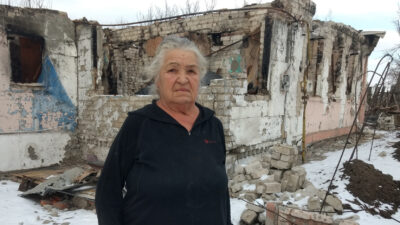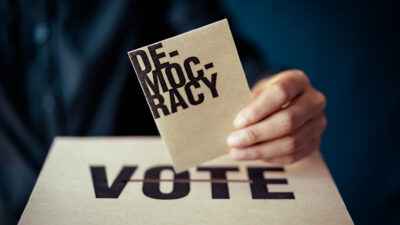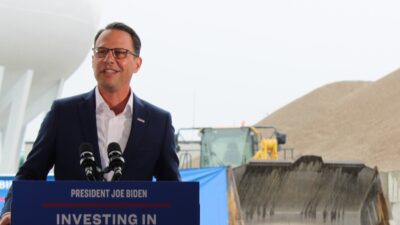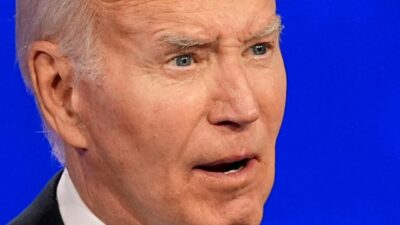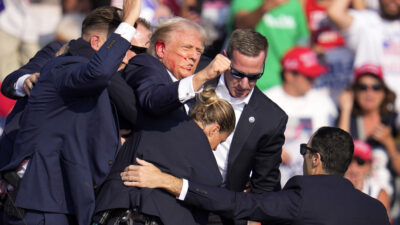Hundreds of the Ukraine’s pretty little villages have been burned or blasted from its rich earth. …What was once a land of proud beauty has become one of the most desolate places in all of vast Russia. – National Geographic, May 1944
PETROPAVLIVKA, Ukraine — Maria Kurtnizirova was a year old when journalist Eddy Gilmore detailed the devastation in Ukraine during World War II. Nearly 80 years later, she finds herself caught within that tableau of ruin, only the liberator of the past has become the destroyer of the present.
In 1944, “vast Russia” vanquished German forces from “the” Ukraine, then under the yoke of the Soviet Union and Joseph Stalin. Now it is the Russian army laying waste to the “land of proud beauty” as President Vladimir Putin pursues his imperial fantasy of reclaiming the independent nation for Moscow. Fifteen months into the war, Maria remains in disbelief.
“Every morning I wake up and ask, ‘How can this still be?’” she said.
The grandmother lives alone in the eastern enclave of Petropavlivka, 10 miles from Russia and less than half that far from the front line, one of hundreds of “pretty little villages” in Ukraine reduced to ashes. “It is an uneasy dream.”
In this brutal revival of wartime terror, Russia has assumed the role of Nazi Germany, a dark betrayal in the eyes of eastern Ukrainians. For centuries, including after the Soviet Union imploded in 1991, Russia’s culture, language, and religious rituals prevailed in their region, the combined effect of proximity, family ties, and shared history. The invasion has ruptured that sense of kinship, inflicting a psychic wound beneath their physical suffering.
The population in Petropavlivka fell from 2,000 to less than 300 after Russian troops crossed the border in February last year and occupied part of the Kharkiv region. Maria’s refusal to flee arose from the same patriotic defiance that has caused families across the country to sever ties with relatives in Russia.
“We are in Ukraine,” she said, “and it is not us who should leave.”
When the Ukrainian army recaptured her village in September, Maria held the briefest hope that life might regain its familiar shape. A month later, as shelling resumed, a Russian rocket incinerated her home. She moved into her summer kitchen, a brick outbuilding the size of a one-car garage, and survives without electricity, gas or running water.
The privations are common in Petropavlivka, where the Russian assault has razed houses, schools, and a grain processing plant. The rubble and scarcity remind Maria of growing up in Kharkiv, Ukraine’s second-largest city, in the years after the Nazi occupation.
“We had almost nothing then. And, again, we have almost nothing,” she said, sitting on her bed beside a wood stove, the space’s lone source of heat, as she stroked Rita, her long-haired cat. What differs from 80 years ago for Ukrainians – aside from the enemy’s uniform – lies in perceptions of their neighboring country. The border now delineates the divide between Ukraine’s sovereign future and Russia’s colonialist history. In the east, kinship has turned to fury.
“Putin is trying to pull us backward into the past,” Maria said. She spoke in Russian, her voice rising above the thump of artillery blasts. “We will not follow.”
****
A crumbling concrete monument in the village of Kamianka honors Soviet soldiers killed in WWII. Russia refers to the battle against Germany and Adolf Hitler that ended in 1945 as the Great Patriotic War. Ukraine discarded that term in 2015 for a Western designation – Second World War – as part of a broader “decommunization” effort to wrest its national narrative from Russia’s grasp.
The campaign began a year after Putin annexed Crimea and backed Russian operatives who seized a portion of the Donbas region in southeastern Ukraine. His land theft was retaliation for the popular revolution earlier in 2014 that toppled Ukraine’s then-president, Viktor Yanukovych, widely viewed as a Kremlin apparatchik.
Putin’s aggression spurred Ukrainian lawmakers to bar communist symbols in public spaces and mandate the renaming of streets, plazas, cities, and villages that commemorated Soviet-era figures. The ban spared the thousands of WWII monuments that cast lingering shadows of Russian imperialism across Ukraine’s history and identity.
Stalin conscripted an estimated 7 million Ukrainians into the Red Army during the war. Their forced enlistment in service of Moscow occurred two decades after his predecessor, Vladimir Lenin, suppressed Ukraine’s struggle for independence and compelled the country to join the Soviet Union at its founding in 1922.
The maternal grandfather of Nataliya Idorovets died wearing a Red Army uniform while fighting the Germans in Ukraine in 1943. She lives near the WWII monument in Kamianka, 80 miles from Kharkiv, along a rutted dirt road in a home battered by Russian artillery last spring.
Russian soldiers captured the farming village of 1,000 people early in the invasion, and over the next six months, the area marked a segment of the front line. Families fled under intense shelling that damaged or destroyed every single dwelling, and by the time Ukraine’s military liberated Kamianka in September, fewer than 50 residents remained.
“Stalin and Lenin made Ukrainians die because of Russia,” said Natalyia, a retired school teacher. “Putin is the same.” She stoked the coals inside a cinder-block “stove” in her side yard that she has used to cook meals since the war’s first weeks, when the village lost electricity and gas. “He kills us because he doesn’t want us to be free.”
After the Russians flooded into the Kharkiv region, Natalyia stayed in Kamianka with her ailing husband, Nikolai, and their son and daughter-in-law. Nikolai’s frail health made evacuating too perilous, and with medical care scarce under the occupation, his condition worsened. He died in July. “My husband is a war victim,” she says. “Russia took his life.”
Enemy troops stole much else from villagers, raiding vacant houses for appliances, electronics, tools and farming equipment. Similar behavior throughout Russian-held areas typifies Moscow’s legacy of looting Ukraine. Since the mid-17th century, Kremlin leaders have plundered the country’s people, land and natural resources to feed their ravenous appetite for empire.
“These soldiers told us, ‘We can move you to Russia,’” Natalyia said. She shook her head, wrapped in an orange scarf, and cursed in her native Russian. “Why would we go? So they can take more?”
Last fall, it was the invaders who left, retreating from Ukraine’s counteroffensive as they abandoned artillery shells, anti-tank barricades and other battlefield accessories. Natalyia’s son converted empty ammunition boxes into stairs for the house and turned the lids into window shutters, evidence of the family’s resolve to outlast the war.
Their perseverance testifies to the generational courage of Ukrainians as they seek to throw off Russia’s centuries of tyranny. “My grandson is a soldier,” Natalyia said. She smiled beneath a brilliant blue sky. “He fights for Ukraine.”
****
A half-mile separates the agrarian vocational school where Alexander Evdoshenko teaches and the house in Staryi Saltiv where he lives. The summer resort town, located 12 miles from Russia in the Kharkiv region, fell to enemy forces early in the invasion. Last May, as the Ukrainian army mounted a fierce counterattack, Russia pounded the area with artillery and missiles to protect its withdrawing troops.
The assault destroyed the school and damaged the home that Alexander, an agricultural studies instructor, shares with his wife, Liudmila, the school’s bookkeeper. Standing outside his gutted workshop, he nodded toward fragments of an artillery shell in their backyard.
“Putin wanted this war from the first day he became president,” Alexander said. He had walked home from a nearby aid distribution site carrying a jug of water in each hand. He described the humanitarian deliveries of food, water and other essentials to the town as the thin difference between life and death for many of the 250 residents in Staryi Saltiv, where the pre-war population exceeded 3,300.
“Without this help, some people wouldn’t make it,” he said. “It would be almost impossible to survive.”
Alexander’s interest in farming traces to his youth in Kharkiv and hearing about the Holodomor from his parents. The state-imposed famine that Stalin orchestrated in the 1930s killed millions of Ukrainians after the Soviet dictator collectivized the country’s abundant agricultural resources.
He seized control of Ukraine’s grain supply and exports for the dual purpose of starving its people – an attempt to crush the vestiges of their cultural and political independence – and to propel Russia’s industrial rise. The Kharkiv region endured extreme suffering, and growing up in the ’60s, Alexander learned that his mother and father lost relatives to the famine.
“These stories made me think I needed to know food and farming,” he said.
In an ominous echo of the Holodomor, a term that translates as “death by hunger,” Putin bragged last fall that his country would harvest a “record” 150 million tons of grain in 2022. He omitted that an untold amount of the yield included grain that his army hijacked from Ukrainian ships and ports in the Black Sea and Sea of Azov.
Russian soldiers have laced arable fields across Ukraine with land mines while pillaging farm machinery, livestock, and crop reserves. Their depredations threaten the world’s food supply and evoke war crimes committed in Ukraine by Nazi forces. “Putin is doing what Stalin and Hitler did,” Alexander said. “He doesn’t want us to exist.”
For the Evdoshenkos, the bombing of the agriculture school last year magnified the bleak historical parallels between the Russian and German invasions. The war has eliminated their jobs, hollowed out their town, and blown open holes in their home.
Still, they intend to stay, revealing the strength of spirit within Ukraine that Putin, like Stalin and Hitler before him, has failed to understand – or break. Alexander pointed at the ruined ceiling of his living room. “I would rather die in my destroyed house,” he said, “than live one minute under Russia.”

